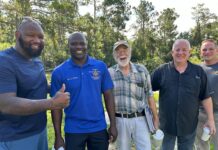Nearly 89,000 girls and women were intentionally killed in 2022, the highest annual number recorded in the past two decades and approximately 48,800 worldwide were killed by their intimate partners or other family member. [1]
The percentage of females murdered by an intimate partner was 5 times higher than for males according to data from the National Incident-Based Reporting System (NIBRS, 2021).[2]
Flagler County is not immune to such atrocities.
Yolonda Williams (Sunrise 7/24/74 – Sunset: 8/2/24) was one of us. A mother, daughter, friend, neighbor, community member, nonprofit employee … an advocate for people in need. She is gone too soon.
I could regale you with statistics about domestic violence, but the truth is one victim experiencing domestic violence is too many.
Domestic violence refers to a pattern of abusive behavior in a domestic setting, often between intimate partners or family members. It encompasses various forms of abuse, including:
- Physical Abuse: Inflicting harm through hitting, slapping, choking, or any other form of physical aggression.
- Emotional/Psychological Abuse: Manipulating, threatening, or belittling a partner to undermine their self-esteem and emotional well-being.
- Sexual Abuse: Coercing or forcing a partner into unwanted sexual activities or behaviors.
- Economic Abuse: Controlling a partner’s access to financial resources, which limits their independence and ability to leave the relationship.
Domestic violence can occur regardless of age, gender, race, or socioeconomic status and often has severe physical and emotional consequences for the primary and secondary victims.
Domestic violence has far-reaching impacts on individuals, families, and communities including: physical health effects lasting well beyond the initial bruises, broken bones or other physical injuries including gastrointestinal disorders, reproductive health problems and chronic pain. Survivors of domestic violence may experience a higher risk of conditions such as heart disease and obesity. Survivors often experience anxiety, depression, and post-traumatic stress disorder (PTSD) and prolonged emotional abuse can lead to diminished self-worth and confidence. The economic impact includes job loss and reduced productivity, which can limit a person’s financial independence. Children who witness domestic violence can suffer from behavioral issues, emotional difficulties, and developmental delays. Domestic violence incurs significant costs in healthcare, legal services, and lost productivity, often estimated in billions annually creating a strain on community resources with increased demand for social services, law enforcement, and healthcare assistance. Overall, the impacts of domestic violence extend beyond the individual, affecting families and society as a whole. Addressing these consequences is vital for healing and prevention.
If I had a dime for every time someone asked me, “Why doesn’t she just leave”, I quite literally could be wealthy. This question highlights the misunderstanding about domestic violence, essentially saying a simple cross-town geographical relocation is the solution. Domestic violence is significantly more insidious than an apartment move. It is incumbent upon us, as a society, to recognize barriers victims face daily, become more aware of how you personally can help and as a community provide better support. This includes helping victims shed the shame and guilt often accompanied by victimization. And how do we do this? You speak up and hold perpetrators accountable to their actions. You provide compassionate support to victims and not shame them. You join as a community and address the gaps…because it takes all of us to address domestic violence. I believe in survivors and I believe in Flagler County.
“Just keep helping people who end up like me. Keep saving them. I would still be in living hell or ACTUALLY DEAD if you guys weren’t there…thank you for giving my pet a beautiful chance to live safely too…I was going to lose him to terrible consequences.” Love, A Survivor
If you or someone you know is in an abusive relationship, please call/text the Family Life Center Helpline (386) 437-3505 to speak with an advocate confidentially. You are not alone!
[2] https://bjs.ojp.gov/female-murder-victims-and-victim-offender-relationship-2021

















































